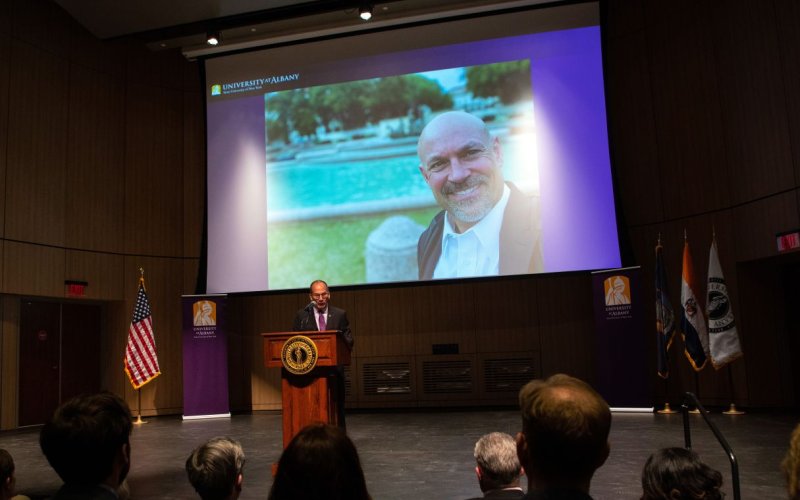UAlbany Launches the Institute for Social and Health Equity

By Erin Frick
ALBANY, N.Y. (April 12, 2023) — The University at Albany this week launched the Institute for Social and Health Equity (ISHE), a new research and training hub that leverages the University’s existing strengths, together with community engagement, to address longstanding societal problems related to health disparities and inequity. Professor Paul L. Morgan, a renowned scholar in the fields of health and educational disparities, will serve as the Institute’s inaugural director.
“The Institute for Social and Health Equity represents a powerful convergence of UAlbany’s parallel missions as a world-class research institution and force for social mobility and educational equity in our world,” President Havidán Rodríguez said. “The COVID-19 pandemic once again showcased how our highly accomplished faculty could apply their expertise to inform critical policy debates around health equity and forge new interdisciplinary partnerships to advance the public good and help those most at risk. Building on the great work that has been done by our scholars for decades, ISHE will expand the reach and impact of this work, and there is no better person to lead this effort than Dr. Paul Morgan.”
The new Institute, housed within the Division for Research and Economic Development, builds on UAlbany’s longstanding research strength in minority health disparities and its work on behalf of New York State during the COVID-19 pandemic.
"Disparities in both health care access and quality continue to plague historically underserved communities,” said SUNY Chancellor John B. King Jr. “Overcoming such gaps demands that we quantify and address the shortcomings with research and action. I thank the University at Albany for launching the Institute for Social and Health Equity to address health care inequities and pursue better, fairer outcomes."
“UAlbany researchers across disciplines have a long history of working on problems that expose the ways that minority communities disproportionately face challenges detrimental to health and wellbeing,” said Vice President for Research and Economic Development Thenkurussi (Kesh) Kesavadas. “These include topics such as maternal and infant health outcomes, risk factors for cardiovascular disease and exposure to environmental toxins in the water and air, to name a few. Understanding the drivers that underly and perpetuate these disparities, and developing strategies to mitigate them, requires a cross-cutting approach that includes building partnerships within and beyond the university.
“This is why we have created the Institute for Social and Health Equity — a mechanism to support research into these critical issues that are pervasive in our society. The Institute will offer structural and financial support for these efforts, as well as training opportunities for researchers who want to develop and deepen their research skillsets in topics and methods related to studying social and health equity.”
Cultivating Collaboration
ISHE will provide a “home” for multidisciplinary research collaborations and offer services to support researchers including dedicated grant writing expertise, individual and small-group consulting on research proposals, panel reviews to assist in developing these proposals and seed grant funding for promising projects. Programming for existing and prospective research partners will include invited speaker series as well as trainings to develop skills that advance research addressing social and health equity.
The Institute will be organized into research interest groups to facilitate collaboration among researchers working across disciplines. Several groups have already formed. These include interdisciplinary collaborations focused on maternal and child health disparities and environmental health disparities.
Director Paul Morgan joins UAlbany from Penn State University, where he most recently served as the Harry and Marion Eberly Fellow and Professor of Education and Demography in the Department of Education Policy Studies. Morgan’s primary research investigates health and educational disparities during childhood, particularly in disability diagnosis and treatment, as well as other types of disparities including in early STEM learning.
“ISHE is a newly formed university-wide institute designed to increase interdisciplinary and interinstitutional collaborations across UAlbany’s colleges and schools, as well as other SUNY campuses and community and government organizations,” Morgan said. “The Institute will bring together researchers exploring questions around topics such as public health, assisting socially vulnerable populations, and emergency management. All disciplines seeking to understand and address social and health inequities are welcome to engage in ISHE trainings and other activities, share ideas and gain research support.”
An Evolving Research Ecosystem
UAlbany began leveraging its work in this area in 2005 with the creation of the Center for the Elimination of Minority Health Disparities — a collaborative effort among UAlbany researchers and community organizations to understand and address health disparities among underserved populations, specifically in the smaller cities and towns of New York.
Then, in April 2020, just after the onset of the pandemic, then-Gov. Andrew Cuomo tapped President Rodríguez and UAlbany to lead the “Differential Impacts of COVID-19” project – an innovative research “ecosystem” that formed around an interdisciplinary working group of over 35 UAlbany researchers and yielded valuable outputs including peer-reviewed studies, presentations and government reports.
“The ‘Differential Impacts of COVID-19’ project sought to identify the environmental, socioeconomic and occupational factors that explain why COVID-19 disproportionately harmed Black and Hispanic New Yorkers — and to propose practical intervention strategies to eliminate these disparities and save lives,” said Associate Vice President for Research and Economic Development Theresa Pardo, who led the work.
“The success of this project, together with the Center for the Elimination of Minority Health Disparities and related initiatives, set the stage for the creation of the Institute for Social and Health Equity — which will enjoy a broader mission that goes beyond health disparities to encompass, more generally, social and health equity issues.”
The Center for the Elimination of Minority Health Disparities will be housed under the ISHE umbrella. The Institute will also coordinate with the BILPOC Faculty Advancement Initiative to support efforts to improve faculty diversity through hiring, as well as retention and promotion of current UAlbany faculty who identify as people of color.




